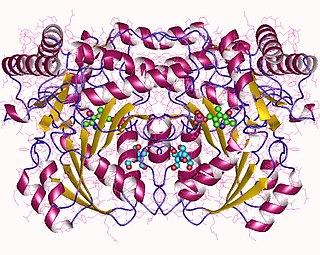| glycine transaminase | |||||||||
|---|---|---|---|---|---|---|---|---|---|
| Identifiers | |||||||||
| EC no. | 2.6.1.4 | ||||||||
| CAS no. | 9032-99-9 | ||||||||
| Databases | |||||||||
| IntEnz | IntEnz view | ||||||||
| BRENDA | BRENDA entry | ||||||||
| ExPASy | NiceZyme view | ||||||||
| KEGG | KEGG entry | ||||||||
| MetaCyc | metabolic pathway | ||||||||
| PRIAM | profile | ||||||||
| PDB structures | RCSB PDB PDBe PDBsum | ||||||||
| Gene Ontology | AmiGO / QuickGO | ||||||||
| |||||||||
In enzymology, a glycine transaminase (EC 2.6.1.4) is an enzyme that catalyzes the chemical reaction
- glycine + 2-oxoglutarate glyoxylate + L-glutamate
Thus, the two substrates of this enzyme are glycine and 2-oxoglutarate, whereas its two products are glyoxylate and L-glutamate.
This reactions strongly favours synthesis of glycine. [1] This enzyme belongs to the family of transferases, specifically the transaminases, which transfer nitrogenous groups. The systematic name of this enzyme class is glycine:2-oxoglutarate aminotransferase. Other names in common use include glutamic-glyoxylic transaminase, glycine aminotransferase, glyoxylate-glutamic transaminase, L-glutamate:glyoxylate aminotransferase, and glyoxylate-glutamate aminotransferase. This enzyme participates in glycine, serine and threonine metabolism. It employs one cofactor, pyridoxal phosphate.




